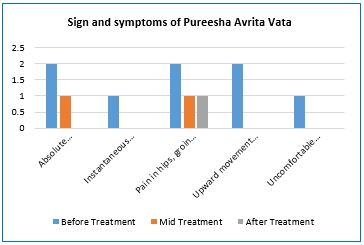Role of Udavartahar Chikitsa in the management of Pureesha Avrita Vata w.s.r. to Chronic Constipation on Constipation Assessment Scale: A Case Study
Keywords:
Pureesha Avrita Vata, Matra Basti, Snigdha Virechana.Abstract
Background: Pureesha Avrita Vata is defined as the absolute constipation along with Parikartika (Fissure in Ano), Shroni Vankshana Prstha Ruk (pain in hips, groin and back) and uncomfortable sensation in chest region etc. The main features of Constipation are infrequent or hard stool, abdominal pain, bloating, and feeling of unsatisfactory bowel evacuation. Contemporary laxatives, which are generally used in Constipation, become habitual after some duration and only symptomatic relief. Moreover, these medicines never alter pathogenesis of disease. So, it is a need of hour to search effective, safe & alternative formulations in Ayurveda, which can completely break the pathogenesis of Pureesha Avrita Vata. As per Ayurveda, Vata Dosha and Pureesha Mala are the main factor involved in this condition. Therefore, the prime treatment principle recommended by Ancient Acharyas is Snigdha Udavartahar Kriya. Aim & Objectives: This case study is primarily carried out to study Pureesha Avrita Vata w.s.r. to Constipation and to evaluate role of Chinchalavan Taila Matra Basti, Indukanta Ghrita orally with Snigdha Virechana in the management of Pureesha Avrita Vata. Methods: A 68 years old male patient approached Kayacikitisa I.P.D. with Pureesha Avrita Vata for one year; he was administered 60ml Chincha Lavana Taila Matra Basti for 7 days, Indukanta Ghrita orally and Snigdha Virechan for consecutive 15 days. Result: Patient has significant effect to improve the Constipation Assessment Scale from 15 to 03 and in other classical features of Pureesha Avrita Vata.
Downloads
References
Brandt LJ, Prather CM, Quigley EM, Schiller LR, Schoenfeld P, Talley NJ. Systematic review on the management of chronic constipation in North America. Am J Gastroenterol 2005;100(Suppl 1):S5-S21.
Tripathi B. Charak Samhita, Chikitsa Sthana, Chaukhambha Orientalia, Varanasi, ed, Shloka,70-72/28, 2018,950.
Andrews CN, Storr M. The pathophysiology of chronic constipation. Can J Gastroenterol. 2011 Oct;25 Suppl B:16B-21B. PMID: 22114753; PMCID: PMC3206564.
Wickham RJ. Assessment of Constipation in Patients with Cancer. J Adv Pract Oncol. 2016 May-Jun;7(4):457-462. Epub 2016 May 1. PMID: 29226003; PMCID: PMC5679034.
Singh SK, Rajoria K. Ayurvedic management of chronic constipation in Hirschsprung disease - A case study. J Ayurveda Integr Med. 2018 Apr-Jun;9(2):131-135. doi: 10.1016/j.jaim.2017.11.004. Epub 2018 May 29. PMID: 29853328; PMCID: PMC6033722.
S.Gaurav, S.Punam. Role of Snigdha Virechana with Chinchalavan Taila in the Management of Malavastambha A Case Report. JPRI, 33(33B): 132-139, 2021; Article no. JPRI.70543
Prasad GP, Nagalakshmi V, Babu G, Swamy GK, et al. Effect of vardhamana Indukanta ghritam in Parinamashula (duodenal ulcer). J R.A.S 2008;29:15-28.
Shah N.C. Bharat Bhaishayajya Ratnakar. 1st Edition, Vol – I, New Delhi: B. Jain Pblishers; 2005.
Rao SS, Rattanakovit K, Patcharatrakul T. Diagnosis and management of chronic constipation in adults. Nat Rev Gastroenterol Hepatol. 2016 May;13(5):295-305. doi: 10.1038/nrgastro.2016.53. Epub 2016 Apr 1. PMID: 27033126.
Tripathi B., Charak Samhita, Chikitsa Sthana, Chaukhambha Orientalia, Varanasi, ed, Shloka, 197/28, 2018, 973.
Charaka, bala D, Shastri RD, Acharya YT, editors. Siddhisthana. 5th ed. Varanasi: Chaukhambha Sanskrit series; 2001. Charaka Samhita, Agnivesha; p. 701. [Google Scholar]
Charaka, Bala D, Shastri RD, Acharya YT, editors. Siddhisthana. 5th ed. Varanasi: Chaukhambha Sanskrit series; Charaka Samhita,Agnivesha; p. 682. [Google Scholar]
Shastri L, editor. Siddhidsthana. 1st ed. Baidyanath Ayurved Bhavan Pvt. Ltd; 1989. Ashtanga Samgraha with Sarvanga Sundari Vyakhya; p. 1105. [Google Scholar
S.Gaurav, S.Punam ,Role of Snigdha Virechana with Chinchalavan Taila in the Management of Malavastambha A Case Report. JPRI, 33(33B): 132-139, 2021; Article no. JPRI.70543
Joshi, A., Mehta, C. S., Dave, A. R., & Shukla, V. D. (2011). Clinical effect of Nirgundi Patra pinda sweda and Ashwagandhadi Guggulu Yoga in the management of Sandhigata Vata (Osteoarthritis). Ayu,32(2), 207–212.
Prasad GP, Nagalakshmi V, Babu G, Swamy GK, et al. Effect of vardhamana Indukanta ghritam in Parinamashula (duodenal ulcer). J R.A.S 2008;29:15-28.
George S.K., Rajesh R., Kumar S.S., Sulekha B., Balaram P. A polyherbal ayurvedic drug--Indukantha Ghritha as an adjuvant to cancer chemotherapy via immunomodulation. Immunobiology. 2008;213(8):641–649. doi: 10.1016/j.imbio.2008.02.004. Epub 2008 Apr 16. [PubMed] [CrossRef] [Google Scholar]
Charaka Samhita, Sutra Sthana, Aatreyebhadrakapiyeadhayaya, 26/43(5). Available from: http://niimh.nic.in/ebooks/ ecaraka/?mod=read. [Last accessed on 2020 Sep 27].
Shah N.C. Bharat Bhaishayajya Ratnakar. 1st Edition, Vol – I, New Delhi: B. Jain Pblishers; 2005.
Brian walker. Davidson’s Principles and practice of Medicine, Edition 22 revised















